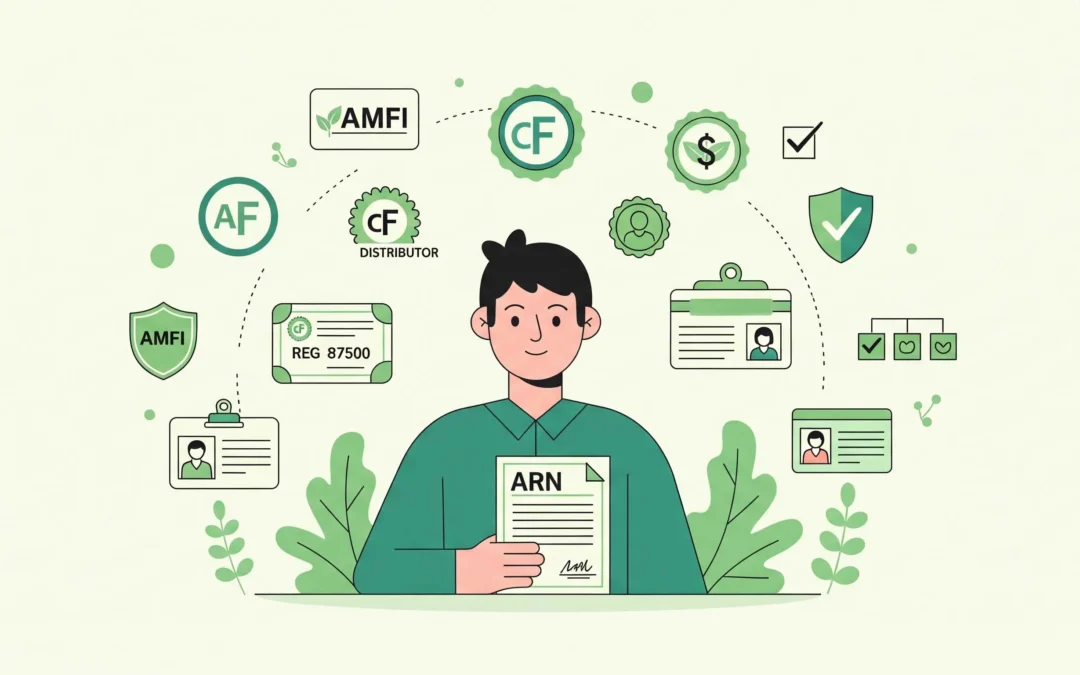ARN number stands for AMFI Registration Number, that are assigned by the Association of Mutual Funds in India (AMFI). This number is proof that the mutual fund distributor is certified. The certificate that gives proof of credibility is valid for 3 years and requires renewal. It is mandatory for distributor-led investments as it gives protection to them and enhances adherence to regulations.
This topic can be complex and hence may require some guidance on it. This article will help you get deep knowledge on ARN number along with its need.
What is the ARN Number in Mutual Funds?
The Association of Mutual Funds in India (AMFI) assigns this special code to people and organizations that are permitted to distribute mutual fund products in India. The ARN serves as a license to the holder’s compliance with SEBI rules and passing the necessary NISM certification.
Anybody who sells mutual funds legally, whether they are an online platform, bank, or individual advisor, needs to have an ARN. Before making an investment, it also assists investors in confirming the legitimacy and dependability of their distributor.
Key Features:
- Distributed to eligible mutual fund distributors by AMFI
- Verifies adherence to NISM and SEBI standards.
- All transactions involving mutual funds must include a quote.
- Has a validity period that is renewable upon recertification, typically lasting three years.
- Guarantees investor protection and transparency in the distribution of funds
How to Get an ARN Number in a Mutual Fund?
1. Pass the NISM Mutual Fund Test
Registering for the NISM Series V-A: Mutual Fund Distributors Certification is the first step. This will demonstrate your knowledge and eligibility regarding this field.
2. Fill out the application for ARN.
Get the application form by going to the official AMFI website. Carefully enter your information, making sure that every field is correct.
3. Attach Documents
The following must be attached:
- Aadhaar and PAN cards
- Certificate of NISM Exam
- A passport-sized photograph
- Proof of address and identification (per KYC regulations)
- Make the registration fee payment.
4. Registration Fee
Depending on the applicant type (individual or organisation), the fee usually varies between ₹3,000 and ₹10,000. Online or demand draft payment options are available.
5. Get Your Card and ARN Number
You will receive your ARN card and certificate after AMFI has reviewed your application and supporting documentation. You will also be given an EUIN (Employee Unique Identification Number) if you work for a distributor.
Need for ARN Number in Mutual Funds
1. Lawful Permission
According to AMFI and SEBI regulations, it is required for anyone wishing to sell or distribute mutual fund schemes in India.
2. Increases Credibility and Trust
Dealing with ARN-registered advisors is preferred by investors since it attests to the distributor’s certification and adherence to industry norms.
3. Makes Commission Earnings Possible
Distributors are not permitted by law to receive commissions or trail income from mutual fund companies if they do not have an ARN.
4. Required for Transactions
To process distributor-led investments, redemptions, or switches, mutual fund houses need ARN information.
5. Ensures Adherence to Regulations
Having an ARN guarantees compliance with KYC regulations, NISM certification, and moral distribution standards.
Common Mistakes to Avoid While Applying for ARN
1. Submitting an Expired NISM Certificate
When submitting an expired NISM certificate, make sure your NISM Series V-A certificate is still valid. One of the most common grounds for rejection is expired certificates.
2. An incomplete or inaccurate application
Verify all the information again, including the name, PAN number, exam results, and contact details. Your application may be delayed by even small inconsistencies.
3. Uncertain or Missing Documents
Unnecessary delays may result from submitting hazy photocopies or failing to submit required documents like Aadhaar or PAN.
4. Inaccurate Payment of Fees
Keep the receipt or proof of transaction close at hand and make sure you pay the appropriate fee according to your category (individual or corporate).
5. Failure to Adhere to KYC Guidelines
Disqualification may result from utilizing out-of-date address proofs or avoiding KYC verification. Prior to applying, always update your KYC records.
Bottomline
The conclusion can be drawn that getting an ARN number can be important for lawful permission and increase the credibility of your service. An individual or organization needs to follow a specific set of procedures to get this number through the Association of Mutual Funds in India (AMFI). However, there are some common mistakes, like submitting an expired NISM certificate or missing documents.
Individuals should make sure that their NISM is still valid, or else they should take renewal exams to make it valid.
Written by: Tanya Kumari


